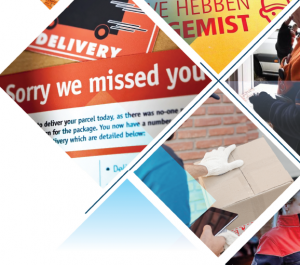In B2B parcel deliveries are well planned, repeatable and reliable, the B2C segment is less predictable due to fluctuations in demand, for example, the busy December period, and the unpredictability of the customer’s at-home status. How can parcel companies solve this issue in B2C?
Failed deliveries
Especially the unpredictability of customer’s at-home status leads to a high rate of failed deliveries. This implies re-delivery, which generates extra costs, extra kilometers and extra emissions. In the current situation, when a parcel cannot be delivered at the address of an addressee a delivery person will try to deliver a parcel at a neighboring address. If none of the neighbors is at home as well, a parcel is taken back to the depot and the process is repeated the next delivery day. In the worst case, a failed delivery happens several subsequent delivery days which results in a parcel being delivered at a pick-up-point or worse, returned to sender. Arjen Kingma (Almende/Qring) wrote a white-paper about improving parcel delivery through address intelligence.
Reduce the number of ring attempts
Simulations show that the number of ring attempts can be reduced by 12% and failed deliveries can be reduced by 61% if the at-home status of 30% of households can be determined in advance. This leads to more efficient for parcel companies. The smart doorbell Qring offers a “last minute” solution for unnecessary delivery attempts. Your phone tells you whether you can accept packages or not.
Less failed deliveries
The results of a Monte Carlo simulation show that the number of failed deliveries is also decreasing with the use of address intelligence. This means that parcels do not have to be returned to the depot as often, after which they have to be delivered again the next day. It is estimated that one failed delivery costs around €7,50. This also implies the financial benefits can be significant.
Control of processes
For parcel companies, it is difficult to forecast how long it will take to deliver a parcel. This leads to either slack in the network and/or late delivery of parcels. This is caused by the disruptions that can occur in this process. Address intelligence can make the delivery process more predictable. With more insight into the at-home status of consumers, the time per delivery becomes more consistent and trip planning more reliable. This allows the ETA of a delivery to be determined more accurately, which simplifies planning. This would also open the door for other ways of delivery like parcel lockers and cargo bike deliveries.

